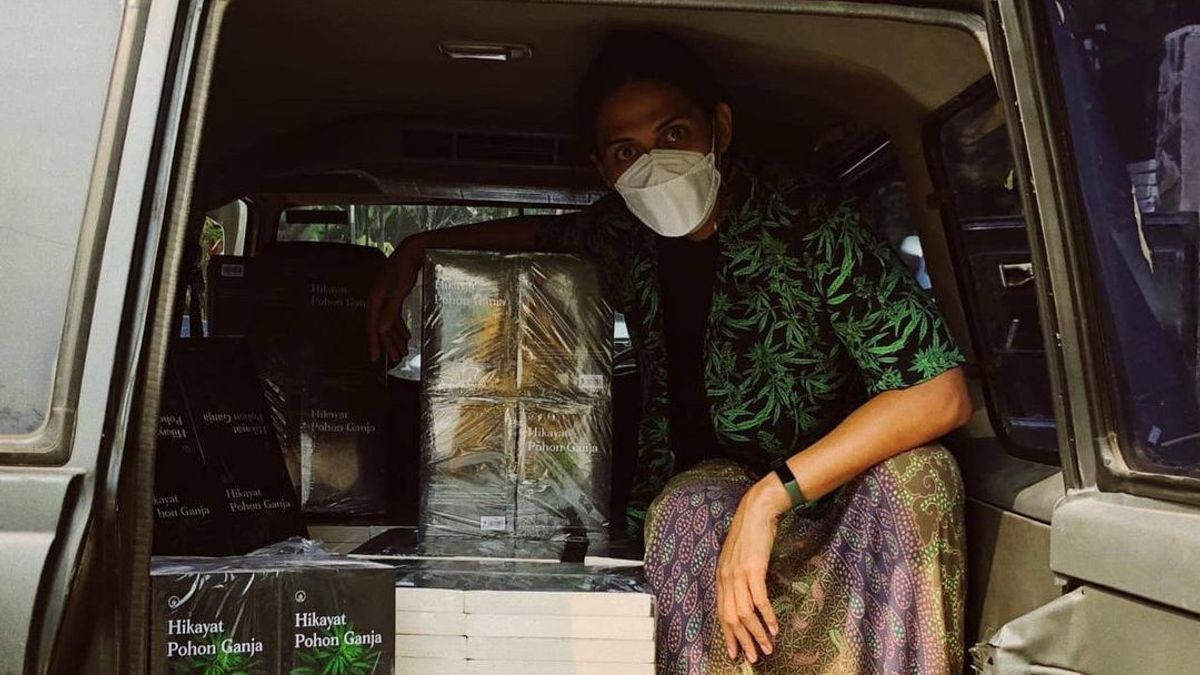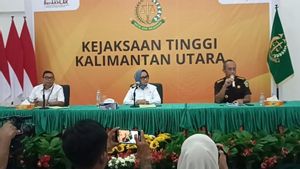JAKARTA - The police confiscated the book Hikayat Tree Ganja in the case of possession and consumption of marijuana by Erdian Aji Prihartanto alias Anji. The police's move is highlighted. Already paranoid about marijuana, paranoid about books too. On the other hand, the confiscation of this book actually revived the discussion about marijuana in the context of benefits.
West Jakarta Metro Police Chief Kombes Ady Wibowo, who gave a statement regarding the discovery of the book Hikayat Cannabis from Anji's hands. In his language, Ady called the police "securing evidence."
"We got the cannabis seeds at the second location. Then the marijuana stems. Inside this box secures the marijuana stems and then there is a book, Hikayat Tree Ganja," Ady said to reporters, Wednesday, June 16.
Anji admits that the Hikayat Tree of Marijuana is a form of education. Anji wants to know why many countries in the world legalize marijuana, while Indonesia does not. Right. The Hikayat Tree Ganja book does indeed take the narrative into account through the narrative of the benefits that are highlighted.

"So, according to brother AN, this is part of the education related to marijuana itself because colleagues have also understood that 48 states in America have legalized this cannabis plant. But that's not the domain of the police," Ady.
Before Anji, the police had confiscated another Cannabis Tree Hikayat book from the hands of a young actor, Jeff Smith. Jeff Smith's book was confiscated from his residence in Jagakarsa, South Jakarta. Like Anji, Jeff Smith uses the book Hikayat Tree Marijuana as literacy.
[BOOK REVIEW: Narrative of the Benefits of the Tree of Life]
Not only the Tale of the Cannabis Tree. Jeff Smith collected a number of other books. "The interesting thing is that we found four books related to the cannabis plant," said Pol Kombes Ady Wibowo at the West Jakarta Police, Monday, April 21.
The Cannabis Tree Hikayat book is actually an old book. This book is printed under the title Hikayat Cannabis Tree: 12000 Years of Fertilizing Human Civilization. First published in 2011, this book has been printed in revised editions in February 2019 and March 2020.
The Tale of the Cannabis Tree as literacyThe Tale of the Cannabis Tree was written and compiled by Dhira Narayana with the Lingkar Ganja Nusantara (LGN) team. LGN is a non-profit organization that focuses on researching knowledge about the civilization and culture of cannabis in the archipelago.
And the 342-page book has long been part of cannabis literacy. Hikayat Tree Cannabis was even awarded the Indonesian Record Museum (MURI) as the only book that provides education and knowledge about cannabis in Indonesia.
"The Hikayat Tree of Marijuana is an intellectual statement from Lingkar Ganja Nusantara (LGN). That our ideas and actions (LGN) are based on a scientific order that we dare to be held accountable before a court of law or culture," written in the Foreword section, by Dhira who is the Chairman of LGN.

As we describe in the BERNAS article entitled Seeing The Hikayat Contents of Cannabis Trees that Are Often Confiscated in Marijuana Cases, in this book LGN presents various facts and data related to the use of cannabis plants in human civilization and culture. This book contains basic information about introducing marijuana to the reader.
About medical marijuana, cannabis civilization in the world, to the cannabis culture of the archipelago, which is about how Indonesian people in various regions use marijuana for generations for various aspects of life. There are various other topics in this book.
For example, how cannabis has become a world savior plant or how cannabis is in the international political economic system. The saga of the Cannabis Tree is also able to arouse reason about the criminalization of this million-benefit plant.
'Securing books'Borrowing the language of the police, the action of 'securing the Hikayat Tree of Marijuana' has actually occurred a lot. Marijuana advocate and LGN activist, Singgih Tomi Gumilang, told VOI a number of cases of confiscation of the Hikayat Tree of Cannabis that he encountered in the field.
"Our findings when defending clients in court, it turns out that there are also many law enforcement officers who also brought the book Hikayat Tree Ganja to be confiscated," said Sitomgum, his familiar greeting.
Among the cases Tomi cited were the arrest of artist Sathya Wiku Narabudhi in Bali; picking a tattoo artist, Ardian Aldiano in Surabaya; to the case of a student named Haidar Baqir Azhar in Bekasi. They are literate users.
"This is proof that the Indonesian people have opened themselves up to accept the situation that marijuana is health, it's not just a myth today."
Dhira Narayana, the author of the book Hikayat Cannabis Tree and the Chairperson of LGN said the same thing. Dhira said that today many people consume marijuana because they are motivated by the principle of its benefits. Unfortunately, many of them are also imprisoned because of the marijuana policy which Dhira thinks is wrong.
"There are more than 50 thousand Indonesians who are imprisoned for cases of using marijuana. Okay, according to the law they are wrong. But you also know, dong, many of them use marijuana for positive things. Helping them sleep, reducing depression, for relaxation, for treatment , all kinds of things," said Dhira, quoted by VOI, Friday, June 18.
Drug policy issuesRegarding narcotics policy, this case has long been in the spotlight of many parties. Law (UU) No. 35 of 2009 on Narcotics is considered obsolete. This law is outdated. In the context of the use of the cannabis plant, it has lost its relevance.
As reviewed in the WRITING SERIES entitled The Origin of the Narcotics Law and the Myriad of Problems Behind it, from the beginning, Law 35/2009 was a problem. He was never born sovereignly by the Indonesian government.
Law 35/2009 was born in the United Nations (UN) convention in 1961. At that time, the UN established a legal product that must be ratified by Indonesia and other UN member countries.
For Indonesia, the ratification automatically revokes the colonial law Verdoovende Middelen Ordonnantie, replaced by Law 9/1976. Since then, the prosecution of drug users began. The rewards are no joke. From prison to tickets to the afterlife.
After that, Indonesia again changed the national law on narcotics. The reference is the same: the UN convention. Several times Indonesia's narcotics policy has been adjusted. Unfortunately not significant because it still refers to the convention. Marijuana is illegal. Point.

Even when the United Nations (UN) Commission removed marijuana from the list of dangerous drugs in the world. Indonesia to this day still bases itself on the old policies.
In December 2020, the UN Narcotics Commission approved the World Health Organization (WHO) recommendation to remove cannabis and cannabis resin from Agenda IV under the 1961 Single Convention on Narcotics. Cannabis and one of its derivatives are placed in the same category as heroin and other opioids.
By that classification, marijuana is considered not only "highly addictive and highly criminally responsible," but also labeled "extremely dangerous and of very limited medical or therapeutic value."
This UN recognition is an important start to legitimize the health benefits of marijuana. This move is largely symbolic and may not have a direct impact on the way the government controls narcotics. But it could give impetus to efforts to legalize medical marijuana in countries seeking UN guidance.
"Hopefully this book can provide enlightenment for anyone who masters it. And hopefully this book can also provide inspiration for new policy changes. Because our current policies are useless," said Dhira.
"Believe me, this policy that has been in effect for 12 years in Indonesia has not changed our narcotics situation in the slightest. There are only arrests, arrests, arrests again, which we don't know in the end. So isn't this the right time for us to revise our narcotics policy? ?"
*Read other information about the LEGALIZATION of marijuana or read other interesting articles from Detha Arya Tifada and Yudhistira Mahabharata.
Other BERNASThe English, Chinese, Japanese, Arabic, and French versions are automatically generated by the AI. So there may still be inaccuracies in translating, please always see Indonesian as our main language. (system supported by DigitalSiber.id)













